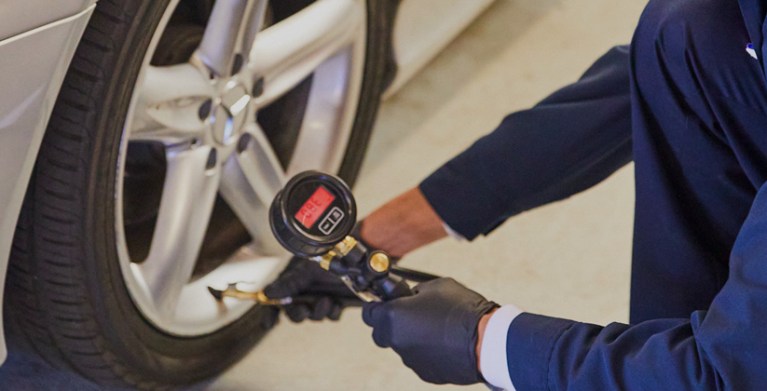Keep Rolling Smoothly: GMC Tires Service by Morris Tires
Keep Rolling Smoothly: GMC Tires Service by Morris Tires
Blog Article
Tire Solution: The Effect of Climate Condition
When it comes to guaranteeing optimal efficiency and safety on the roadway, recognizing the effect of weather conditions on tire service is essential. GMC Tire Service. In this conversation, we will discover the intricate connection between weather conditions and tire solution, dropping light on the significance of weather-specific tire upkeep techniques and considerations.
Warm and Tire Performance
When exposed to high temperatures, tires experience changes in efficiency that can substantially affect lorry safety and security and handling. The warm created from extended driving or hot weather problems causes the tire rubber to soften, leading to decreased walk life and boosted wear.

Cold Weather Condition Impacts
Cold weather problems can have a significant effect on tire performance and safety and security. In chilly weather condition, tires might likewise shed air pressure more quickly, which can influence taking care of and fuel effectiveness.
To minimize the impacts of winter on tires, it is vital to routinely check tire stress and inflate them to the supplier's recommended levels. Utilizing winter or all-season tires made for cool weather condition problems can also enhance grip and grip on icy or snowy roadways. Proper tire maintenance, consisting of routine examinations for wear and damage, becomes much more important during chillier months to make sure optimum efficiency and security.
Rainy Conditions Impact
During rainy conditions, tire efficiency and safety and security can be considerably influenced by the damp roadway surfaces and minimized exposure. The step pattern of tires plays an important duty in maintaining grip on damp roads. Tires with damaged treads are more susceptible to hydroplaning, where a layer of water builds up in between the tire and the road surface area, bring about loss of grip. To fight this, chauffeurs should frequently examine their tires for appropriate step depth and take into consideration buying tires specifically developed for damp problems.
Additionally, wet climate can likewise decrease exposure, making it challenging for chauffeurs to see the roadway ahead plainly (GMC Tire Service). In such conditions, it is important to change driving rates accordingly and keep a secure complying with range to allow for sudden stops. Properly inflated tires can also assist in preserving control on wet roads by offering much better handling and grasp
Snow and Tire Security
When driving in snowy conditions, having the right tires can make a substantial distinction in security and performance. Winter season tires are developed with unique rubber compounds and step patterns to give better grip on snow and ice contrasted to all-season tires.

Additionally, motorists need to take into consideration mounting tire chains in extreme snowy conditions. Tire chains supply added grip by clutching the snow and ice, enhancing stability and look these up control. It is important to adhere to manufacturer instructions when utilizing and installing tire chains to stop damages to the tires and vehicle (GMC Tire Service). By choosing the ideal tires, keeping appropriate rising cost of living, and considering extra grip help like tire chains, motorists can improve their security when browsing snow-covered roads.
Weather-Related Tire Maintenance
When confronted with numerous climate condition, appropriate tire upkeep comes to be an important element of car safety and performance. Weather-related tire upkeep incorporates a series of practices focused on making certain optimal tire function and durability in different weather condition scenarios. One crucial element of weather-related tire upkeep is tire pressure guideline. Changing temperatures can cause tire pressure to differ, affecting grip and gas performance. On a regular basis adjusting and checking tire stress according to supplier suggestions is essential for risk-free driving in changing climate problems. Additionally, tire step deepness plays a substantial duty in dealing with different weather components. Tires with sufficient tread depth supply far better grip on wet or icy roads, reducing the risk of skidding or hydroplaning. When step wear reaches a specific deepness is essential for keeping grip and security in their website damaging climate, examining tire step regularly and changing tires. By focusing on weather-related tire upkeep, drivers can improve safety and security, boost lorry performance, and prolong the life expectancy of their tires.
Final Thought
In final thought, climate conditions have a substantial impact on tire performance and security. From warmth impacting tire stress and put on to cool weather condition lowering traction, it is vital to take into consideration the climate when maintaining and utilizing tires.
In this conversation, we will certainly discover the elaborate connection between weather problems and tire solution, losing light on the value of weather-specific tire maintenance techniques and factors to consider.

Report this page